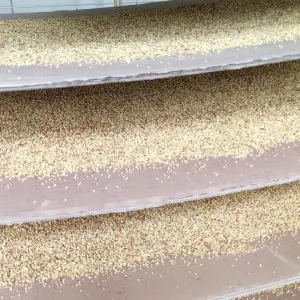Oct . 30, 2024 12:23 Back to list
pollination of pear trees to improve quality product
Pollination of Pear Trees to Improve Quality Products
Pollination is a critical process that significantly influences the quantity and quality of fruit production in pear trees. This biological phenomenon occurs when pollen from the male part of the flower fertilizes the female ovules, leading to the formation of seeds and, subsequently, fruit. The success of pollination affects not only the yield of pears but also the overall quality, taste, and texture of the fruit, making it a key focus for growers.
To improve the quality of pear products, understanding the pollination requirements of different pear varieties is essential. Most pear trees are not self-pollinating; they require pollen from another variety to achieve optimal fertilization. For instance, popular varieties like Bartlett and Bosc are known to benefit from cross-pollination. Planting compatible varieties nearby can significantly enhance the pollination success rate, thus boosting fruit quality.
In addition to planting compatible pear varieties, organizing an effective pollination strategy involves attracting pollinators such as bees. Bees play a vital role in pear pollination, and their activity can directly affect fruit set and quality. Creating a bee-friendly environment by planting diverse flowering plants nearby can invite these pollinators, ensuring that pear trees receive adequate pollen. Growers should also consider the timing of flowering periods, as synchronizing the bloom of different varieties can optimize pollination opportunities.
pollination of pear trees to improve quality product

Moreover, sustainable farming practices can further improve pollination rates. Minimizing pesticide use during flowering periods is crucial, as many chemical treatments can be harmful to bees and other beneficial insects. Implementing integrated pest management (IPM) strategies can help protect pollinators while ensuring that trees remain healthy and productive.
Enhancing the quality of pears through effective pollination practices not only benefits growers but also consumers. High-quality pears are characterized by their flavor, firmness, and overall visual appeal. They stand out in the marketplace, leading to increased consumer satisfaction and demand. As a result, investing in research and education on pollination methods can yield significant economic benefits for the pear industry.
In conclusion, improving the quality of pear products through effective pollination is a multifaceted approach. By understanding pollination dynamics, fostering pollinator health, and practicing sustainable farming, growers can produce superior pears that delight consumers and enhance profitability in the market.
-
Artificial Pollination Solutions for All Plant Pollen Types
NewsJul.29,2025
-
Premium Plant Pollen for Pure Pollination & Pollen Block Solutions
NewsJul.29,2025
-
Artificial Pollination Solutions for Efficient Crop Yields
NewsJul.28,2025
-
Premium Cherry Pollen for Pure Pollination & Different Types of Pollen
NewsJul.28,2025
-
Eco-friendly Fruit Paper Bags with Pollen Block Technology
NewsJul.26,2025
-
Premium Kiwi Pollen for Sale – Fresh Male Kiwi Pollen Supplier
NewsJul.25,2025